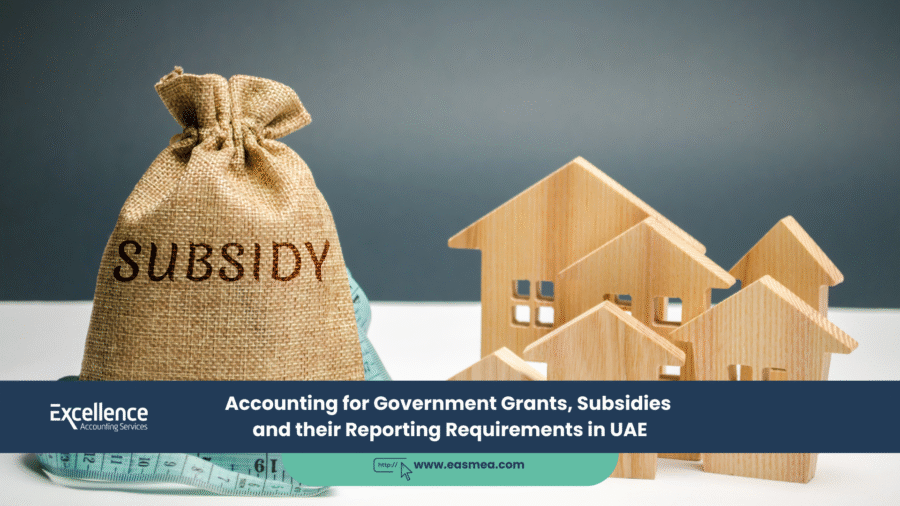Accounting for Government Grants and Subsidies and their Reporting Requirements
Governments worldwide, including in the UAE, often provide financial assistance to businesses in the form of grants, subsidies, and other incentives. This support is designed to encourage specific economic activities, such as investing in new technology, promoting research and development, creating jobs, or operating in key sectors. For a business, receiving a government grant is a significant boost, but it also comes with specific accounting and reporting obligations.
- Accounting for Government Grants and Subsidies and their Reporting Requirements
- The Core Principle: Recognition and Matching
- Grants Related to Assets vs. Grants Related to Income
- What Excellence Accounting Services (EAS) Can Offer
- Frequently Asked Questions (FAQs)
- Maximize the Benefit, Master the Compliance.
The accounting for government assistance is not as simple as recording cash received. The international standard that governs this area, IAS 20, Accounting for Government Grants and Disclosure of Government Assistance, sets out clear rules for how and when to recognize and present these grants in the financial statements. Misinterpreting these rules can lead to non-compliant financial reports and a misrepresentation of a company’s true financial performance.
This guide will walk through the essential principles of accounting for government grants and subsidies, explaining the different types of grants, the correct accounting treatments, and the critical disclosure requirements to ensure your business remains transparent and compliant.
Key Takeaways
- IAS 20 is the Rulebook: This is the primary IFRS standard that dictates the accounting for all government grants.
- Recognition Depends on Certainty: A grant cannot be recognized until there is reasonable assurance that the business will comply with all its conditions and that the grant will actually be received.
- Matching Principle is Key: Grants should be recognized as income over the periods in which the business recognizes the related costs that the grant is intended to compensate.
- Two Types of Grants: The accounting treatment differs significantly for grants related to assets versus grants related to income.
- Full Disclosure is Required: Financial statements must clearly disclose the accounting policy adopted for grants, the nature and extent of grants recognized, and any unfulfilled conditions.
The Core Principle: Recognition and Matching
IAS 20 establishes a fundamental principle: a government grant is not recognized until there is reasonable assurance of two things:
- The entity will comply with the conditions attached to the grant.
- The grant will be received.
Crucially, grants should be recognized in profit or loss on a systematic basis over the periods in which the entity recognizes the related expenses for which the grant is intended to compensate. This is known as the matching principle. A grant should not be credited directly to shareholders’ equity.
Grants Related to Assets vs. Grants Related to Income
IAS 20 distinguishes between two main types of grants, each with a different accounting treatment.
1. Grants Related to Assets
These are grants given with the condition that the business must purchase, construct, or acquire long-term assets (like machinery or a building). IAS 20 allows two methods for presenting these grants in the financial statements:
- Deferred Income Method (Recommended): The grant is initially recorded as “deferred income” (a liability) on the balance sheet. This deferred income is then gradually released to the profit and loss statement over the useful life of the asset, in line with its depreciation.
- Deduction from Asset Cost Method: The grant is deducted from the gross cost of the asset. This results in a lower carrying value for the asset and, consequently, a lower annual depreciation charge.
2. Grants Related to Income
These are grants given to support a business with specific expenses or to compensate for immediate financial shortfalls (e.g., a grant to cover a portion of employee salaries). These are recognized in the profit and loss statement in the same period as the related expense. They can be presented in two ways:
- As “Other Income”: The grant is shown as a separate line item under other income.
- As a Deduction from the Related Expense: The grant is netted against the expense it is intended to cover (e.g., reducing the reported salary expense).
The chosen accounting policy for both types of grants must be applied consistently and disclosed in the company’s financial reports.
A government grant is not free money from an accounting perspective. It is assistance that must be systematically matched against the costs it is meant to defray, ensuring a true and fair view of performance.
What Excellence Accounting Services (EAS) Can Offer
Correctly accounting for government grants is crucial for compliance and accurate financial reporting. Excellence Accounting Services provides the expert guidance needed to navigate the complexities of IAS 20.
- Grant Accounting Advisory: We provide clear advice on the correct accounting treatment for different types of grants, ensuring your policies are fully compliant with IFRS.
- Financial Statement Preparation & Disclosure: We ensure your financial statements correctly present government grants and that all necessary disclosures regarding the nature, extent, and conditions of the grants are made.
- Compliance and Reporting: We can assist in preparing any required reports for the granting government body, demonstrating that you have met all the conditions of the grant.
- Tax Advisory: Our UAE corporate tax experts can advise on how government grants are treated for tax purposes, ensuring you understand the impact on your overall tax liability.
- Liaison with Auditors: We work with your external auditors to ensure they have the documentation and support needed to audit the grant accounting, leading to a smoother audit process.
Frequently Asked Questions (FAQs)
If you fail to meet the conditions, the grant usually becomes repayable. This is known as a “clawback.” The repayment is accounted for as a change in an accounting estimate. The accounting entry will depend on how the grant was originally recognized, but it will typically involve recognizing a liability for the amount to be repaid.
Non-monetary grants, such as land or other resources, are usually accounted for at their fair value and treated in the same way as monetary grants. If a fair value cannot be established, the asset and grant are sometimes recorded at a nominal value.
The UAE Corporate Tax law provides that certain government grants and subsidies may be exempt from taxation, subject to specific conditions. However, this is a complex area, and businesses should seek professional tax advice to determine the status of their specific grant.
A government grant involves a transfer of resources (cash or assets). Government assistance is action by the government designed to provide an economic benefit to an entity or range of entities but does not involve a direct transfer of resources. Examples include free technical advice or the provision of loan guarantees. This type of assistance is disclosed in the notes but not recognized as income.
No, not necessarily. You can only recognize it when there is “reasonable assurance” that you will meet the conditions and receive the funds. If the conditions are significant and will be met over a long period, recognition of the grant income will also be spread over that period.
A forgivable loan is treated as a government grant when there is reasonable assurance that the entity will meet the terms for forgiveness of the loan. Until that point, it is treated as a standard loan liability.
While both are allowed under IAS 20, the deferred income method is generally preferred by many accountants and analysts. It provides greater transparency by showing the gross value of the asset and the grant separately on the balance sheet.
You must disclose: (a) the accounting policy adopted for grants, including the methods of presentation; (b) the nature and extent of grants recognized in the financial statements; and (c) unfulfilled conditions and other contingencies attaching to government assistance that has been recognized.
Yes. A grant can increase cash flow and profitability, which would positively impact a business valuation. However, analysts will also look at the sustainability of the business without the grant, so it’s important that the grant’s impact is clearly and transparently reported.
Thoroughly read and understand the grant agreement. Identify all conditions, reporting deadlines, and potential clawback clauses. Then, consult with your accounting advisor to establish the correct accounting policy and set up the necessary tracking and reporting systems from day one.
Conclusion: Ensuring Transparency and Compliance
Government grants can provide a powerful catalyst for business growth, innovation, and stability. However, this financial support comes with a responsibility to account for it transparently and in accordance with international standards. By understanding the principles of IAS 20 and implementing robust accounting processes, businesses can ensure they meet their compliance obligations, provide a true and fair view of their financial performance, and maintain the trust of all stakeholders.
Maximize the Benefit, Master the Compliance.
Let Excellence Accounting Services provide the expert guidance you need to navigate the accounting and reporting requirements for government assistance.




